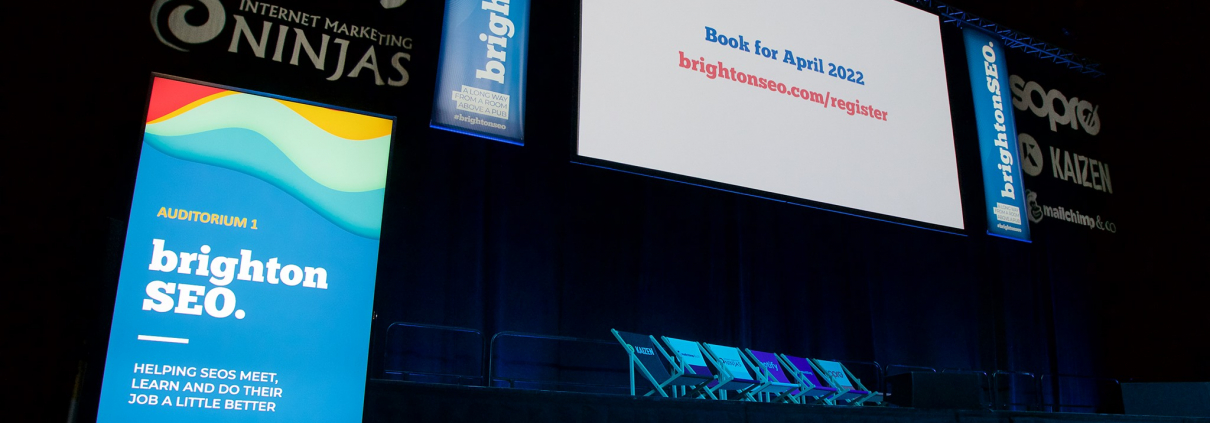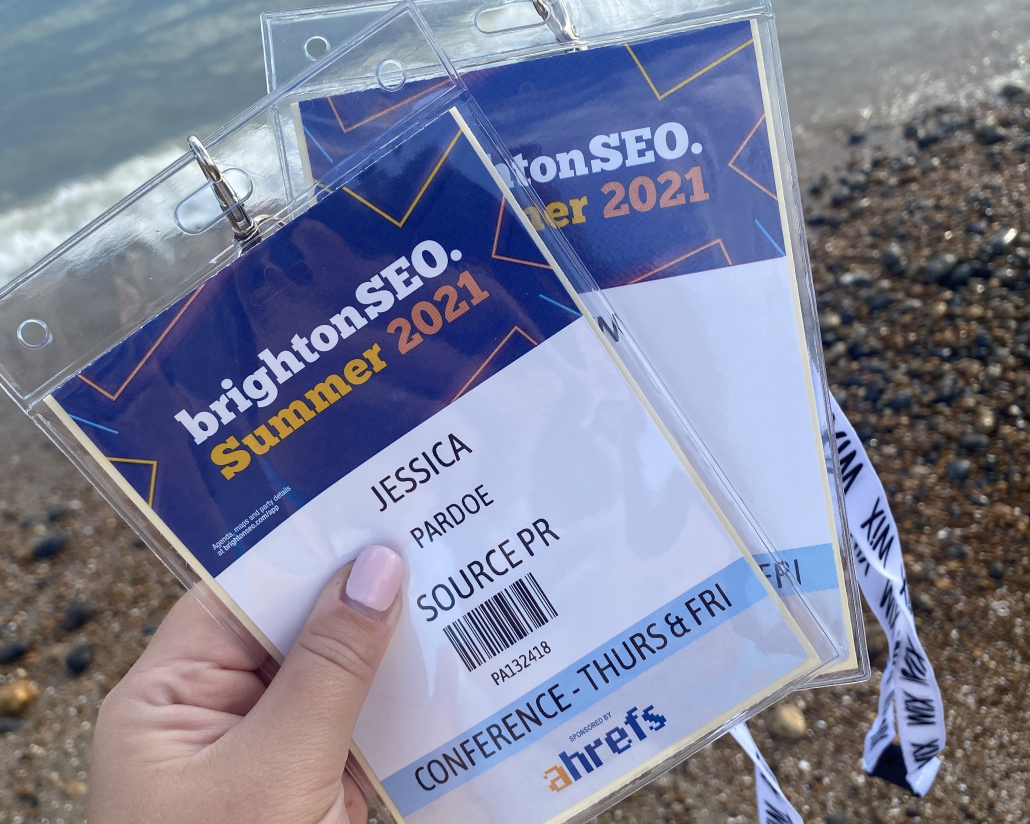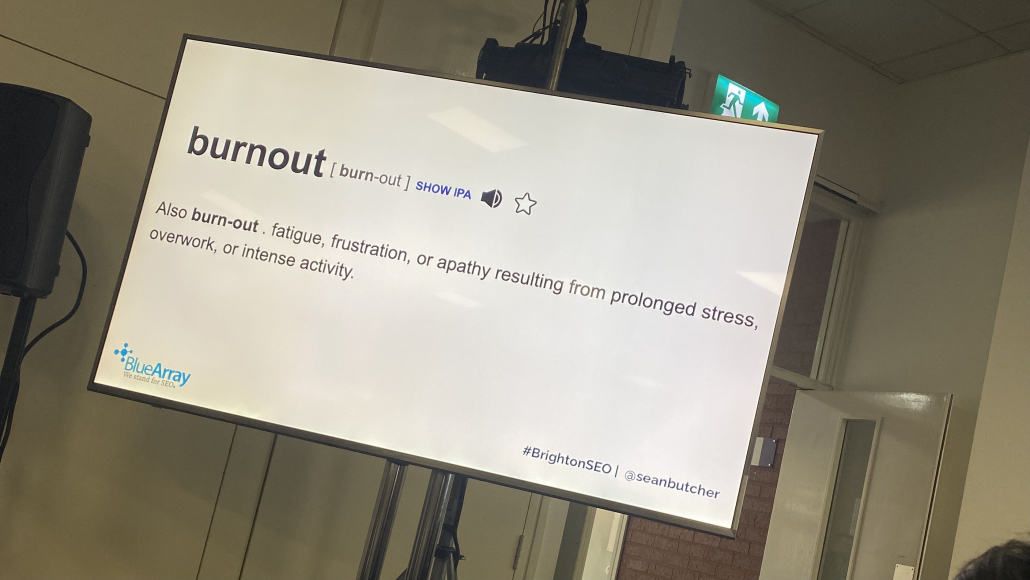Our BrightonSEO Autumn 2021 Takeaways
At Source PR, our bag is traditional PR and social media, but we also offer digital services too. With the incredible growth of this industry, it would be crazy not to! With this in mind, we packed our bags and headed south to BrightonSEO last week to meet up with, and learn from, some of the GREATEST minds in search and digital. There’s been a handful of blog posts since rounding up the whole event, and so instead we wanted to focus on today our top 10 actionable takeaways, and how we can apply those not only to digital, but the traditional PR space too.
Digital PR And Its Place In Traditional
But first, let’s quickly talk about digital PR and how it has its place within the more traditional sectors of the industry. Digital PR is prominently focused on building backlinks to a website for SEO purposes, and whilst this is an important exercise endorsed by the likes of Google-whizz John Mueller himself, we like to make our PR efforts work harder. So, whilst digital is one of our focuses, we find it works best when bedded in with a solid social media strategy and more traditional PR activity such as events, features, interviews, and CSR initiatives. That’s the future as we see it, and it’s an exciting place to be!
10 BrightonSEO Takeaways For The Traditional World
Below, you can find out what we learned at BrightonSEO and how we’ll apply it to our PR practices. Afterwards, if you’re wanting to learn even more, we’d recommend heading over to this great blog post by Gemma Flinders which includes a whopping 89 tips.
#1 – You Can (And Should) Optimise For Instagram
Social media is huge for us at Source, and should be part of any good PR strategy. But did you know that SEO and social media can go hand in hand? One of the first talks on Friday morning by the wonderful Freya Jones covered exactly this, and she revealed some actionable tips on how to improve the visibility of your client’s posts on the ‘discovery’ page of Instagram. These included utilising alt tags, being consistent with hashtags, making sure your content is ‘interactive’ and going ‘live’ where you can too.
#2 – Traditional PR Can Earn Links Too
The one downfall of the digital PR industry, and I’m sure many would agree, is the lack of relevancy in some campaigns. It’s often spoken out about on Twitter and was actually covered in depth by Beth Nunnington in Auditorium 2 at Brighton on Thursday. As traditional PR and digital PR become more and more aligned, gone are the days of campaigns that bear no resemblance to clients. We’ve always been focused on activity that is directly related to the businesses that we work with, and this is important as it works better for your SEO too. With this in mind, it also proves that traditional PR can earn links as well! Where we’re focusing on stories that are very relevant to our clients, industry research covered at the conference shows that journalists are more likely to add links to their piece, as it directly relates to what the story is about. Win win…
#3 – Your Content Might Be A Win For SEO Too
For years, there has been an ongoing thought that traditional PR and digital PR disciplines need to be kept separate, but why should they? Ultimately both efforts (should) work towards improving the performance of your client. Though our type of PR is focused more around establishing a proficient reputation for the businesses that we work with, there’s no reason why it can’t work to achieve links in the way that digital PR does either. In a fantastic talk by Liz Gration, the idea of ‘content that doesn’t need outreaching’ was put to us. Think statistics pages and thought leadership-led content on behalf of contents. The latter is something we do often here at Source PR, so the idea of posting particularly strong comments to static pages and letting them work their magic is very interesting for us.
#4 – Awareness Days Have Multiple Benefits
At the beginning of last year (wow, doesn’t that seem an age ago now?), we wrote about leveraging awareness days in both PR and social. In a talk by Jen Macdonald, the benefits were reinforced and then some. Interestingly, Jen covered B2B industries which are famously harder to market within but are actually one of our specialities here at Source. She spoke about how events such as #MensMentalHealthWeek can be linked to case studies in construction to win trade and national coverage, largely because these awareness days and weeks, especially the very popular ones, provide lots of article opportunities for journalists who want to link into anything topical. Time to whip out our ‘days of the year’ calendar and get planning!
#5 – Journalists Get A LOT Of Content, We Need To Make Our Stories Worthwhile
In a talk by Dan Snow and James Carson of History Hit, the very first one of the conference, James revealed that as a former journalist of the Telegraph, around 250 articles a day was the norm. In traditional PR, creating captivating stories is in our DNA, but we need to take this revelation into consideration when putting together our campaigns, asking ourselves whether our story is not only compelling enough to be covered, but also will it be looked at by readers? Where digital PRs might see links as the end goal, our purpose is to create content that will reach our audiences, and when our PR is competing with upwards of 250 other pieces, stories need to be ‘readable’ as well as ‘coverable’ by journalists’ standards.
#6 – We Could Ditch The Discovery Phase Of The Content Marketing Funnel?
Any marketeer will know the content funnel, which is (or is some variation of): Discovery ➡️ Awareness ➡️ Consideration ➡️ Conversion. In an insightful talk on content strategy by Lucy Dodds, she revealed that we ought to ditch the discovery phase and stop focusing on traffic for traffic’s sake. As PRs, awareness (and generating it) is our thing, but this point sparked an interesting thought process. Whilst we want plenty of people to hear about our clients, we also have a responsibility to ensure that the right people are hearing about them. If your target demographic is retirees for example, is there any point in writing content that will appeal only to teenagers? Absolutely not. Even if there’s low hanging fruit there in the form of website rankings, it’s simply not worth it, as these visitors are highly unlikely to be convertible. We’re glad these conversations are being had more and more often, as it means that our industry is working harder and smarter in its efforts.
#7 – Podcasts Are The Future!
At the beginning of the year, it was predicted that revenue from podcasts would grow by around 35%. This notion was confirmed by the one and only Azeem, who taught us about the exponential opportunities that audio has. As traditional PRs, we leverage multiple channels to build a great brand image, what’s interesting to us is that it seems that podcasting is here to stay. What’s really great is that podcasts don’t have to be about niche topics either, as Azeem explained those that cover a wider range of areas of interest to the audience often do better than those that are hyper-focused. You should always have at least 4 or 5 files in the bank and hundreds of ideas before launching a channel. Certainly food for thought! Watch this space?
#8 – Traditional PR = A Winner For SEO!
A theme we identified throughout multiple talks is that search volumes often have more impact than any number of backlinks to a website. The more your brand is known and searched-for, the more likely it is to rank on Google (and other search engines). This was highlighted in particular by Stephen Kenwright during his talk on getting search, social and PR efforts working together. This tells us that as PRs, our focus remains the same as always: to build an excellent brand for our clients. Though the digital world is fast-paced and we must keep up with it, good old fashion exposure still works perfectly in creating a reputable brand. This in turn has its own benefits online, proving that traditional PR is very much here to stay.
#9 – PPC Can Support Traditional PR Too
One of the reasons that some people think the traditional PR industry is dated (it isn’t, mostly!) is because of the stubbornness of some to stick to what they know. The truth is, we live in a world that is changing by the day and what might work today, mightn’t tomorrow. One thing that was covered by multiple speakers over in Brighton was the idea of using PPC to make your other campaigns work harder. Just produced a banging blog post that you think more people need to see? Put some Google spend behind it! Or if you’re working on bigger campaigns for your clients with an aim of attracting PR coverage, generating views via PPC isn’t a bad place to start first. Speaking more ‘digitally’ (though none of this is linear), this can also help your website’s SEO too.
#10 – We Need To Talk More About Burnout In The Industry
Finally, let’s end on a note that applies not only to PR, but the whole working world. Since the pandemic, reports of burnout have increased at an alarming rate. In a compelling talk by Sean Butcher, his actionable tips to help combat mental health issues in our day and age included organising your day, managing Zoom time and being realistic with your to-do lists. As we think this is incredibly important for everybody to hear, you can find the full presentation here. Later on the Friday, keynote speaker Stacey MacNaught revealed a stat which I think gave a lot of us that sinking feeling in our stomachs. 32.1% of people say they feel bad at their job every single day. Just take that in for a moment. That’s almost 1 in 3 of us. A further 39.6% said they feel this way at least once a week. No ifs, no buts, this is simply not okay. As an industry we have a responsibility to raise up our peers and our own employees, PR is a tough job but when we’re all happy within it, it’s amazing too.
A note from me: though most of this blog is written on behalf of us all here at Source PR, I wanted to jump in at the end and say that enough is enough. I’m so fortunate to work in a place that values us and makes us feel rewarded all the time, but sadly this is not as common in our industry as it should be. I’ll forever campaign against this until we see a real change in the industry, and that’s also why I’ve just pitched for my first ever talk for an event proposed by Hannah Butcher. So, keep your fingers crossed for me! 🤞🏻
Featured image credit: BrightonSEO.





Trackbacks & Pingbacks
[…] 10 Things We Took Away from BrightonSEO as Traditional PRs by SourcePR […]
Comments are closed.